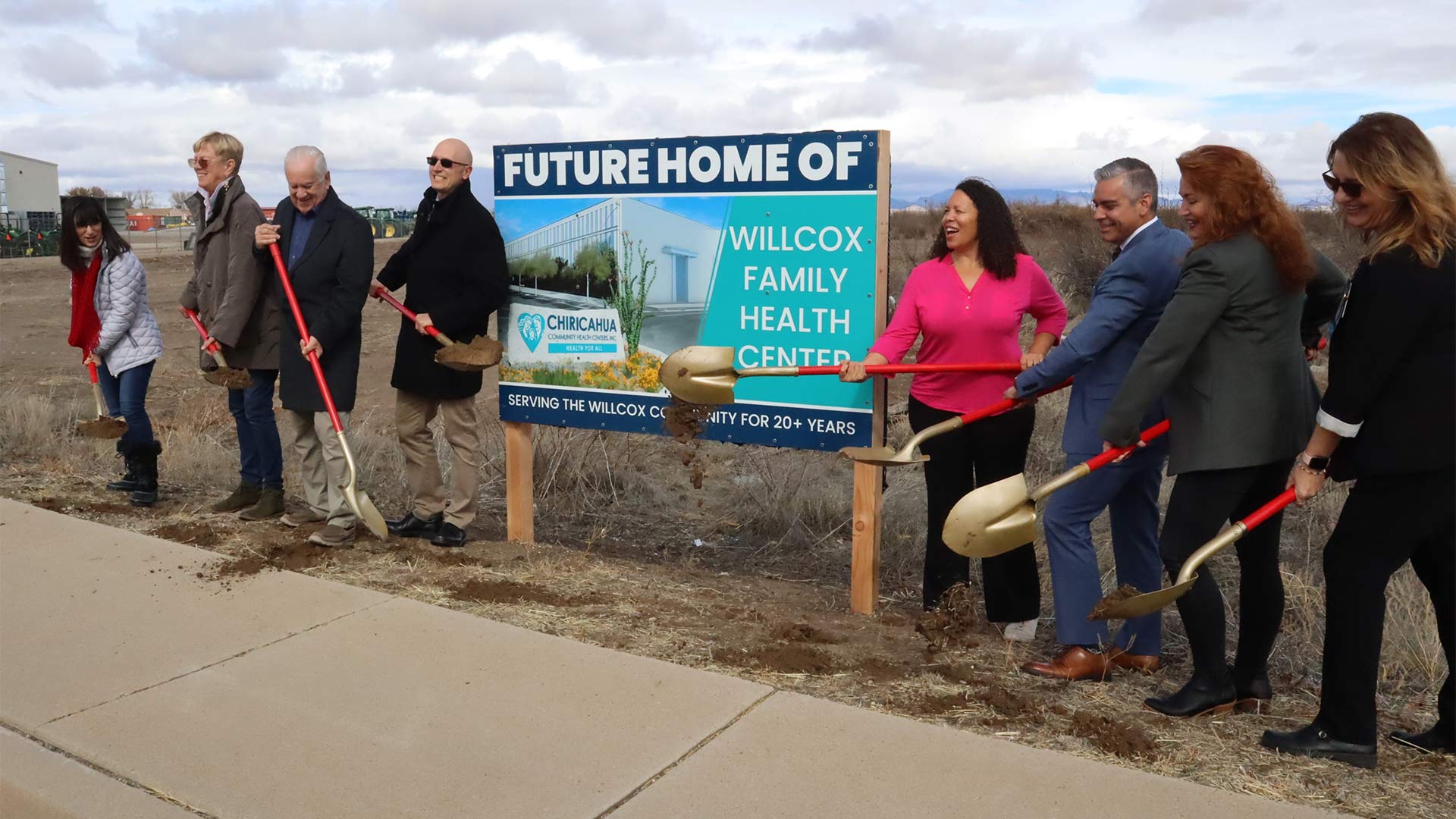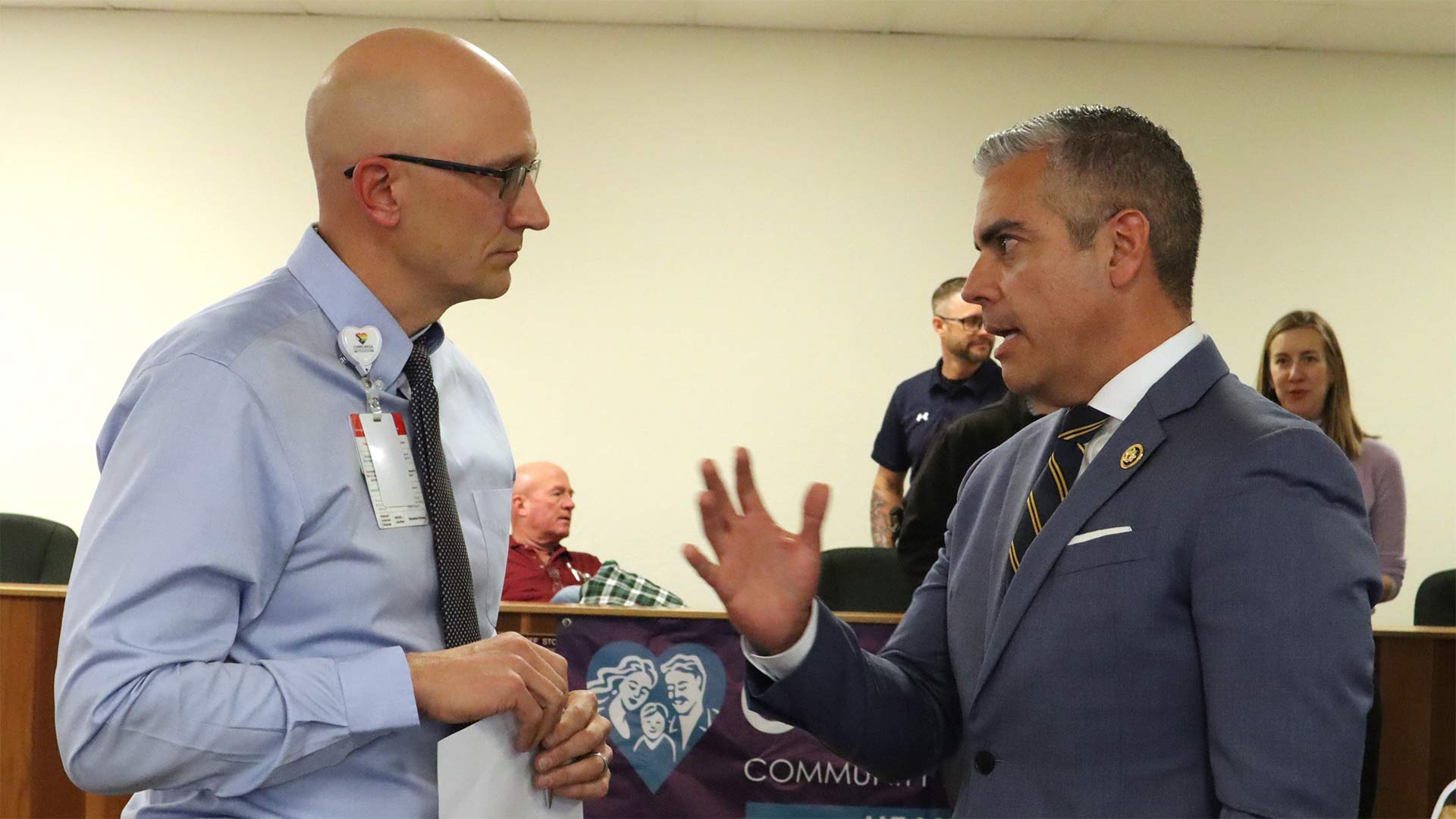 Officials at the groundbreaking event for Chiricahua Community Health Centers' Willcox Family Health Center. January 23, 2024.
Officials at the groundbreaking event for Chiricahua Community Health Centers' Willcox Family Health Center. January 23, 2024.
Officials gathered in Willcox Tuesday to break ground for Chiricahua Community Health Centers, Inc.’s new modular Willcox Family Health Center.
Chiricahua Community Health Centers' Chief Executive Officer Dr. Jonathan Melk said the 2,130 square foot community health clinic will focus on internal medicine and pediatric-care.
“Currently we have all of our operations off of mobile clinic," said Dr. Melk. "So, there’s only two exam rooms. So this will have five exam rooms, a laboratory … It’s going to have much more space to work and to house staff ... We'll be opening up five days a week with both internal medicine and pediatrics ... It's going to be family primary care."
Willcox Mayor Mike Laws said it’s important to have the clinic because it allows people to get treatment close to home.
"During COVID, every hospital bed was full," said Laws. "I want everybody to have the opportunity to stay here if they want to … We have a lot of low income. You know, they can’t just jump in a car and run to Tucson, you know, see a doctor.”
Dr. Jennifer Smith, an internal medicine physician with Chiricahua Community Health Centers, has provided care to Willcox patients in the mobile clinic since 2020.
"One of the main needs truly is primary care," said Dr. Smith. "It's astonishing the number of people that when they start to notice that their blood pressure is high, for example, they'll head to the emergency room. And that is certainly a place where you will be accepted ... But primary care clinics are where we manage blood pressure most of the time, and we do it every day ...
That's just one example but I would say the emergency room use in general is a really good place where you can see where access to care is good or not, because primary care issues can end up being addressed in emergency room settings," she continued.
On a weekly basis, Dr. Smith said she often sees patients who first went to the emergency room.
"It's definitely on a weekly basis that I'll have a patient come back to see me after visiting the ER, or a new patient come to see me after having gone to the ER and maybe even being hospitalized, and they need primary care," said Dr. Smith. "And maybe if they had that all along, they would have been able to avoid that hospitalization or that ER trip. And that's really important for patients who are not insured, because a visit to the ER is probably the most expensive care you can get."
She said there are other primary care providers in Willcox.
"There's at least two primary care clinics run by different entities," said Dr. Smith. "And I think that they do a very good job ... They have a bigger job than they can probably provide because there's so much need."
 Chiricahua Community Health Centers' Chief Executive Officer Dr. Jonathan Melk (left) talks with U.S. Representative Juan Ciscomani (right) ahead of the groundbreaking ceremony for the new Willcox Family Health Center. January 23, 2024.
Chiricahua Community Health Centers' Chief Executive Officer Dr. Jonathan Melk (left) talks with U.S. Representative Juan Ciscomani (right) ahead of the groundbreaking ceremony for the new Willcox Family Health Center. January 23, 2024.
Chiricahua Community Health Centers have been providing medical services to the Willcox area for over 20 years, but exclusively through their mobile bus clinic, mobile dental clinic and pop-up operations during the COVID-19 pandemic, according to Dr. Melk.
"Over time, we've build health centers in Elfrida, Douglas, Bisbee, Sierra Vista and Benson," said Dr. Melk. "Cochise County is a rural county, it doesn't have town after town after town. So, Willcox was from the beginning and continues to be to the present on the plan, and we're just so excited that this is finally going to happen ...
The need for a community health center like Chiricahua are very compelling and they're very strong ... for Willcox," Dr. Melk continued. "We know because we've been running a primary care operation off of mobile health clinics for so many years that what we really need for the community of Willcox and what Willcox would really benefit from is what we would call a fixed-site clinic — otherwise known as a brick and mortar building or an actual building you can walk into, not one that just has wheels."
He said that having the Willcox Family Health Center clinic, which will be a modular building, will help to free up the mobile clinic to travel to other areas in Cochise County.
"These (mobile) units — which primarily sit and conduct primary care — that's not really what they're built to do," Dr. Melk said. "They're built to roam, they're built to go wherever the need is greatest. So, the opening of the modular is going to free the units to go to other communities, or other areas or other sites. So for instance, we could eventually go to the high school, we could go to Bowie, San Simon ...
Elderly residents or disabled residents will no longer have to navigate up the stairs, or up a wheelchair lift onto a mobile (clinic), and provider staff — in some cases — won't have to try to provide healthcare outside of the clinic or outside of the unit," Dr. Melk continued.
U.S. Representative Juan Ciscomani (AZ-6) said it's important to have not just geographical access to care, but financial access to care.
"This is the kind of access that community health centers provide to communities like Willcox, and even in the Tucson community where I live and my family has used community health centers there as well," said Rep. Ciscomani. "That's why this is so important, to bring this to Willcox where there has been a mobile unit but the demand has grown to the point that this has now married it and they made the investment."
Dr. Melk said that Chiricahua plans to hire local healthcare employees to staff the new clinic.
"We plan on hiring local staff, to employ local people that don't have to leave their community to serve, that don't have to go to the city to have a good job with good benefits, and that they can stay — if they choose to — to live in a rural area and to serve the community that maybe they grew up in," said Dr. Melk.
Dr. Melk said the modular building was fully funded by a grant from the Del E. Webb foundation: construction of the modular building should be completed within the next three months.
Looking to the future, Dr. Melk said that Chiricahua hopes to build a larger medical clinic in Willcox.
"Our first step is to open up the modular," said Dr. Melk. "That gets us out of the (mobile) unit and then into the modular building — which is 2,000 square feet versus a 40-foot bus, basically ... But eventually — and eventually meaning the next few years — we really hope to build a full-fledged 20,000 some square foot comprehensive health center that's going to have medical, dental, behavioral health, pharmacy, laboratory and other patient support services all in one spot."
For this larger facility, Dr. Melk said the plans are 75% done.
"It's just really right now, it boils down to not the need — because the need, we know is here — it's going to boil down to the funding," Dr. Melk said. "That, we just need more time, but we're very confident that will come into play."

By submitting your comments, you hereby give AZPM the right to post your comments and potentially use them in any other form of media operated by this institution.